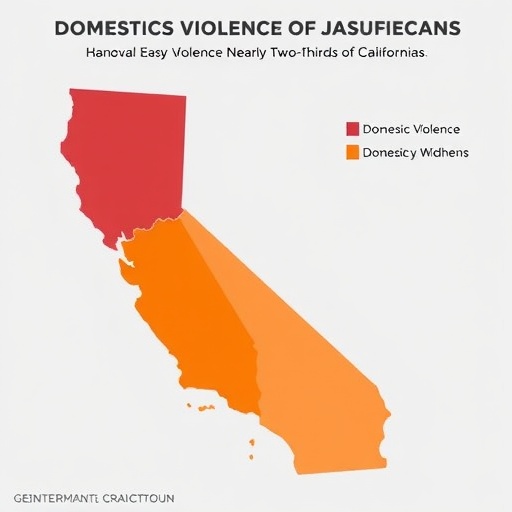SAN FRANCISCO (OCTOBER 8, 2025) — A groundbreaking statewide survey commissioned by the Blue Shield of California Foundation has revealed alarming insights into the prevalence and perceptions of domestic violence throughout California, underscoring this pervasive issue as both a personal and systemic crisis. Nearly two-thirds of Californians—an unsettling 63%—report being affected by domestic violence either through direct experience or indirectly via a family member or close friend. Strikingly, close to one-third of respondents identify themselves as survivors of domestic violence, highlighting the widespread nature of this societal affliction.
The poll offers a comprehensive snapshot of public attitudes towards domestic violence intervention strategies, reflecting a broader cultural shift away from conventional punitive measures toward more rehabilitative and preventive frameworks. A robust three-quarters of respondents believe that domestic violence is preventable, advocating alternatives to incarceration. Such alternatives notably include educational and rehabilitative programs targeting perpetrators, alongside deploying mental health professionals as first responders in non-violent domestic incidents. This perspective aligns with contemporary criminological theories emphasizing restorative justice and trauma-informed care as crucial components in breaking cycles of abuse.
Significantly, 70% of survivors reported a reluctance to involve law enforcement, indicating deep mistrust or dissatisfaction with traditional criminal justice responses to domestic violence. This finding challenges agencies to reconsider how they engage survivors and suggests that alternative, non-carceral responses might better address survivors’ needs and contribute to community safety. The data also reveal substantive public support for augmented funding to expand domestic violence resources, with 84% of Californians endorsing increased state investment in services such as mental healthcare, benefit enrollment assistance, job protections, and direct financial support for survivors.
Debbie I. Chang, MPH, president and CEO of the Blue Shield of California Foundation, contextualized these findings by emphasizing that domestic violence transcends mere statistics and fundamentally affects the lived realities of millions across the state. Chang highlighted that the collective endorsement of state-funded resources and non-incarceration strategies not only reflects a shift in public consciousness but also presents a tangible pathway toward fostering safer and more resilient communities.
This extensive research employed a mixed-methods design, combining qualitative focus groups and a quantitative survey of 2,459 adults aged eighteen and older, conducted in May 2025. The methodology was meticulously engineered to capture diverse demographics and experiences reflective of California’s multifaceted population, including oversampling of women, LGBTQ+ individuals, racial and ethnic minorities, economically insecure populations, and households with mixed immigration statuses. The inclusion of self-identified survivors (31%) and individuals disclosing perpetration of abuse (10%) further enriched the dataset, enabling a nuanced exploration of both victim and perpetrator perspectives.
Beyond domestic violence, the survey identifies intersecting challenges faced by Californians in recent years. Forty-two percent reported experiencing adverse household events such as job loss or serious illness within the past year. A resounding 82% expressed a desire for enhanced state involvement in facilitating access to basic needs including health care, nutrition, and housing, signaling broader concerns around economic insecurity and social determinants of health. Moreover, rising perceptions of racism and discrimination against marginalized groups—including immigrants, LGBTQ+ communities, and people of color—underscore the complex sociopolitical environment within which domestic violence unfolds.
A salient discovery elucidated gaps in public understanding of domestic violence. While a majority acknowledged traditional markers such as physical, verbal, and financial abuse, nearly one in four respondents failed to categorize physical forms of abuse (such as pushing, slapping, or obstructing movement) as domestic violence. Equally concerning, over a quarter of participants did not recognize sexual coercion or forced sex as forms of abuse. These conceptual blind spots impede prevention and intervention efforts, highlighting the critical need for comprehensive education to enhance societal definitions and awareness of all forms of domestic harm.
The Blue Shield of California Foundation’s commitment to generating data-driven insights reflects an ongoing strategic imperative to measure and address domestic violence within a rapidly evolving social landscape. This investigation, the foundation’s third such survey in a decade, sets a benchmark for understanding the multifactorial nature of domestic violence, integrating economic, racial, and gender-based dimensions. Through methodological rigor and inclusivity, the foundation aims to inform policy development, service provision, and community advocacy.
Chang aptly characterized the poll not only as a measurement instrument but as a beacon signaling the urgency of communal listening and responsive action. The foundation’s overarching mission to end domestic violence and position California as the healthiest state demands an evidentiary foundation that captures the voices of those most impacted by abuse. Only by foregrounding survivor experiences and public attitudes can policymakers and practitioners devise durable, impactful solutions that transcend punitive paradigms.
These findings resonate with broader interdisciplinary research emphasizing the importance of trauma-informed frameworks and societal investment in prevention. The data advocate for systemic transformations that expand mental health services, enhance economic supports, and cultivate culturally competent interventions tailored to California’s diverse populations. As public sentiment coalesces around the preventability of domestic violence and support for alternatives to incarceration, policymakers are presented with a uniquely opportune moment to recalibrate domestic violence strategies toward restorative justice and holistic care.
The report and its nuanced insights have been made accessible via the Blue Shield of California Foundation’s website, reflecting transparent knowledge dissemination practices essential for community engagement and advocacy. Collaborations with institutions such as PerryUndem and the Center for Advancing Innovative Policy underscore the intersectional, evidence-based approach foundational to this work. As California confronts the complex realities of domestic violence, this comprehensive survey provides a critical empirical underpinning to inform transformative policies and practices.
In sum, the Blue Shield of California Foundation’s 2025 domestic violence survey delineates an urgent public health crisis underscored by widespread personal impact, evolving perceptions of justice and prevention, and robust community endorsement for state-supported solutions. The multidimensional findings implore a recalibrated societal and governmental response that is inclusive, empathetic, and committed to dismantling barriers to health and safety.
Subject of Research: Public attitudes and experiences related to domestic violence, prevention strategies, and support resources in California.
Article Title: Not provided.
News Publication Date: October 8, 2025.
Web References: https://blueshieldcafoundation.org/resources/collections/perryundem-californians-views-domestic-violence-survey-findings-2025
Keywords: Violence, Health care policy




